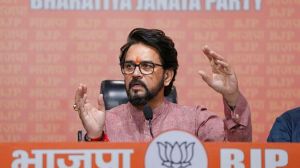‘We have a region where flashpoints could lead to catastrophic conflict’: Australian envoy to India Philip Green
Australian High Commissioner to India for just over a year, Philip Green has been exploring possibilities for further strengthening ties between the two countries.
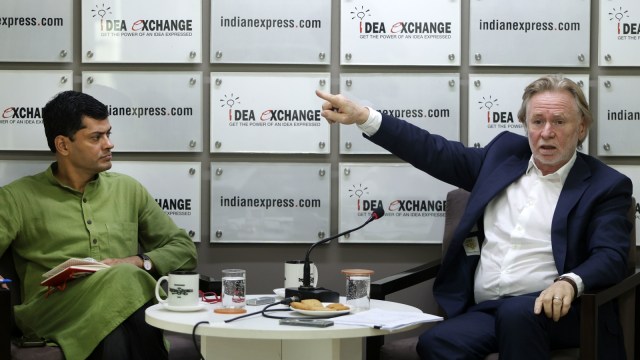 Australian High Commissioner to India Philip Green (right) in conversation with Shubhajit Roy on August 8. (Express photo by Gajendra Yadav)
Australian High Commissioner to India Philip Green (right) in conversation with Shubhajit Roy on August 8. (Express photo by Gajendra Yadav)Australian High Commissioner to India Philip Green on the Indo-Pacific region, economic ties between India and Australia and strengthening defence and security partnership. This session was moderated by Shubhajit Roy, Diplomatic Editor, The Indian Express
Shubhajit Roy: You’ve spent a year in the country. Could you give us a sense of how the relationship between India and Australia has moved?
We are at a very high point in the bilateral relationship with India. The highest point we’ve ever been. My Prime Minister sent me here to keep up that momentum. There are three underlying drivers of this bilateral relationship.
The first is that now Australia and India share strategic alignment. We have always been friends but that friendship has gone up a very big notch in recent years. It’s also largely focused on the way in which we seek to shape the future of the Indo-Pacific region. We both share anxieties about some of the directions in it, and share a very clear vision as to the way we want our region to run.
 Australian High Commissioner to India Philip Green
Australian High Commissioner to India Philip Green
Second is the economy. With India being the fifth biggest economy in the world, which is growing between 7-8 per cent per annum, everyone is bound to take an interest in it, but we’re a bit special because we have strategic alignment and we are a very complementary economy. We produce things that India needs and India produces things we need. Whether it’s energy to drive the next phase of Indian growth, materials and minerals — especially critical minerals to help India drive its effort in the green energy supply chain — or whether it’s job-ready training to those 20 million Indians, who turn 18 each year, India has quality labour. This is very important for exports to our country.
The third underlying driver is the human bridge. Nearly a million people of Indian origin live in Australia. It’s the fastest growing community in Australia.
We have very good relations between our leaders and have set up plans, including a comprehensive strategic partnership, but these three underlying drivers will put us in a very good spot.
ON A FULL-FLEDGED FTA BETWEEN INDIA and AUSTRALIA: There’s a very strong case for further opening of our economies to generate that complementary supply chain… There will be another round of negotiations soon
Shubhajit Roy: China has been seen as a threat and its presence has not been seen as benign in the region. Australia has faced those challenges, and India is facing the same challenges. Do you think there is still a convergence between India and Australia, with regard to China, after the Labour government came to power?
I think there’s increasing convergence, actually. What has changed is that we have stabilised our relationship with China and have removed a large proportion of trade restrictions and re-established engagement, including at the highest levels. Nobody should want an unstable relationship with one of the principal countries of the globe, and I sense that India, too, is looking for a greater level of stability in its relations with China.
What has not changed is our focus on what concerns us in the region. We have a region that is highly contested, where flashpoints could give rise to catastrophic conflict. The main purpose of Australian foreign and security policy is to shape a region where conflict is not a feature and where the underlying effervescence of the Indo-Pacific in people, in the economy, is able to drive greater prosperity. India is a key partner with us.

There are many points of contact between Australia and China and we have a relationship which is now stable and in many ways good, but there are things that China is doing in our region that we do not appreciate. China is undergoing the largest military modernisation seen on the planet since World War II. That is happening without a public clarification of what its purpose is. We would like to have that transparency. China is involved in activities in the South China Sea that are illegal and dangerous. We do not welcome that.
Shubhajit Roy: Do you think China is deterred by this sort of coalition of like-minded countries, the Quad?
The Quad isn’t directed against any particular country. It is focused on what it is for. It’s for a region that is peaceable, stable, where countries large and small are able to exercise their sovereignty. We want a region where no one is dominated. The Quad is also delivering public goods, which is demonstrating to the countries of our region that we are making investments in this being the sort of secure and prosperous region we want. There are investments in maritime domain awareness, vaccine technology, infrastructure, undersea cables and health security.
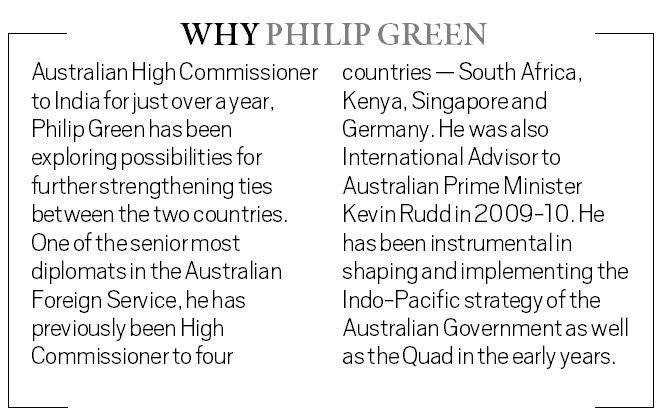
I led the operationalisation of our Indo-Pacific strategy. One of the key aims of that was a deeper relationship with India but another key aim was transforming our relationship with the United States so that it had a very clear focus on our own region.
Shubhajit Roy: There has been concern in some quarters that the Quad has lost steam after the Quad Leaders’ Summit couldn’t take place earlier this year because Joe Biden wasn’t available. Do you think the Leaders’ Summit is something that injects energy? We still have six months left for it to happen.
I would firmly rebut your imagination that the Quad has somehow lost steam. It has only intensified. My government has only intensified its focus in the Quad over the last year or so. I sense from none of the partners any reduction in their commitment to this forum. There are a lot of things going around in the world, not all of them in the Indo-Pacific. The leaders of these four countries are busy, so finding time for them all to be together is not simple. The Quad Summit for this year has many months to take place, and I note that the foreign ministers recommitted to a Quad Summit this year at their meeting in Japan.
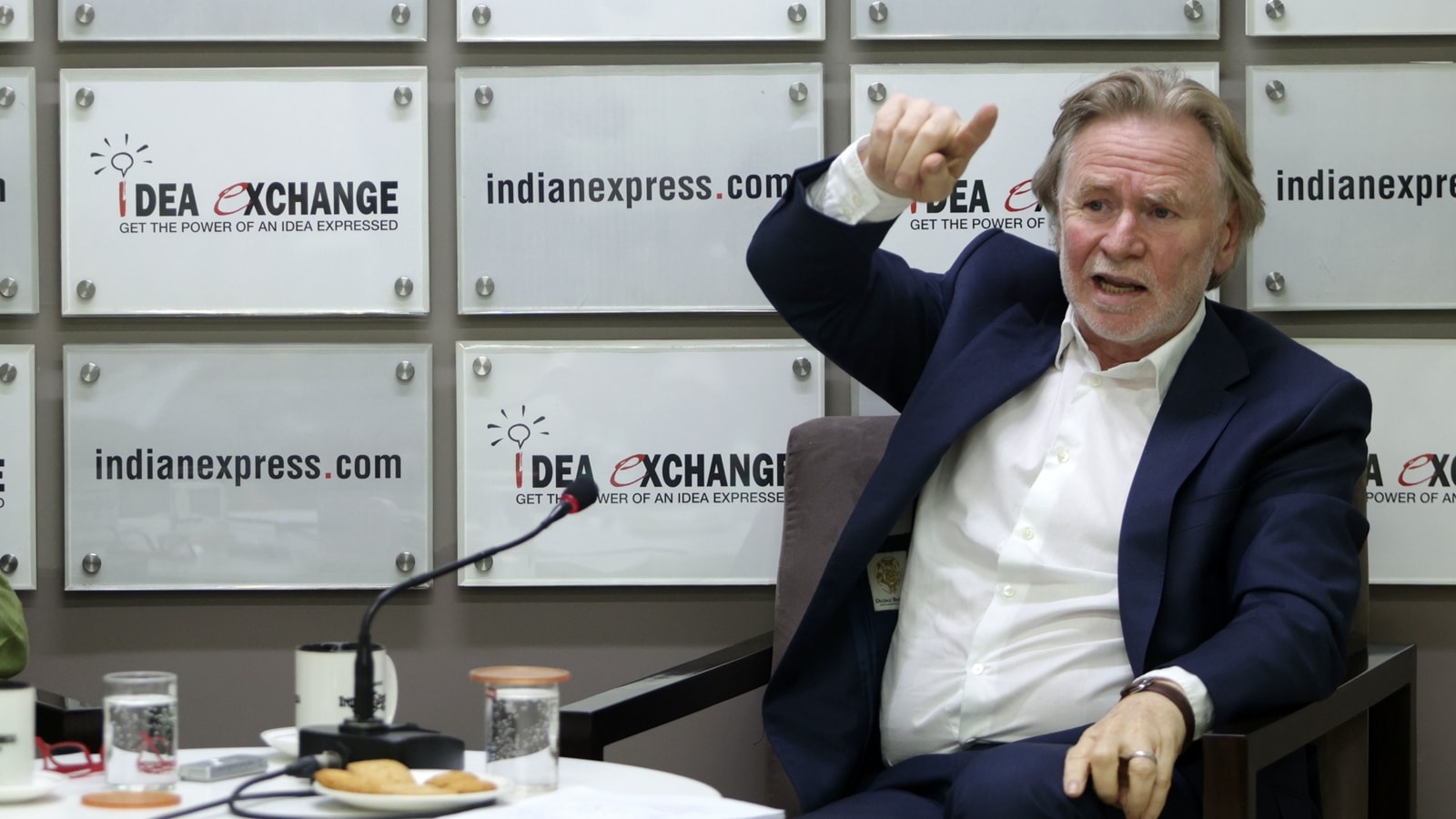 Australian High Commissioner to India Philip Green
Australian High Commissioner to India Philip Green
Shubhajit Roy: Do you think the current situation, where Russia appears to have a stronger hand on the battlefield, gives an impression that countries like China would be emboldened?
The very firm position of my government is that we condemn Russia’s illegal and immoral invasion of Ukraine. Invasion of one country by another is always unwelcome, but in this case we have a larger country invading a smaller country. We have a country that is a member of the permanent five of the UN Security Council, who under the UN Charter is given special responsibility for maintaining peace and security. We have a country which has not respected the boundaries of its neighbour. We are concerned about that instance, and we’re also concerned about any case in which a larger country would seek to use its force against another. Our key ambition for our region is where no country is dominating and all countries are able to exercise their sovereignty in full.
The focus of our country is to support Ukraine so as to put it in a position to end the war on its own terms. I was deeply involved myself as ambassador in Germany. Australia has been very generous to Ukraine in the provision of military equipment and training to try to put Ukraine in the best possible position to end this war on its own terms.
ON RELATIONSHIP WITH CHINA: Nobody should want an unstable relationship with one of the principal countries of the globe, and I sense that India, too, is looking for a greater level of stability in its relations with China
Shubhajit Roy: Do you see the axis between Russia and China developing because of the war?
It concerns us that these two countries are involved in a, as they would put it, no-limits partnership. It would concern us if China was providing support for Russia’s war effort. We are always seeking for relations between the majors — and especially two countries in the UN Security Council — to help preserve and enhance international security.
Shubhajit Roy: Do you think the recent assassination of Hamas leaders has derailed any chance of a peace deal, hostage deal or ceasefire deal in the Israel-Hamas conflict?
I don’t think it has. The principal concern right now is to avoid a wider conflict that would be devastating for the region and have a potentially huge impact on all of us through our economies. The immediate activity that Australian diplomacy is engaged in is through our direct contact with the deep partnership we have with Israel, but also engagement with authorities in Tehran and Beirut to try to avoid a wider escalation.
 Australian High Commissioner to India Philip Green
Australian High Commissioner to India Philip Green
We need to see a ceasefire and Australia has strongly supported the US ceasefire effort, which is now being backed by the UN Security Council. The impact of this conflict in Gaza has been devastating. We are deeply concerned about the humanitarian situation. A ceasefire is a first step towards building peace and security. But, of course, a ceasefire can’t just be one way. Hamas’s terrorist activities have to stop and that organisation has to be dismantled, so it can never again undertake the sort of heinous crime that it undertook late last year.
Shubhajit Roy: In the India-Australia defence and security partnership, what are the broad contours of the defence relationship that are forward-looking?
We are trying to normalise and make more frequent and ordinary the sort of engagement that we’ve been doing together. It’s important to do new things but my defence adviser keeps telling me it’s important to do them over and over again until they become normal in our systems. So there’s a vast amount that is happening in terms of military exercises. The Indian contingent has just come back from our major exercise, Pitch Black. Malabar is just around the corner, on October 8 and 9, and AustraHind is later this year in Pune. It’s also important that we do a lot more exchanges between our personnel, so it becomes routine and natural for Australian and Indian officers and troops to be operating in unison.
I am particularly focused on the question of maritime domain awareness in the North East Indian Ocean. This is a vital strategic waterway, the opening to the choke points of the straits which lead from the Indian Ocean into the South China Sea. Australia and India share a deep strategic interest in this field. The truth of it is that neither of us have the capacity to understand what is happening in this crucial waterway. More sharing of information is required, and not just between Australia and India, our Quad partners are also part of this.
Shubhajit Roy: In the last one year that you have been here, are there any threats that have been averted by sharing information on any terror activity or threat?
Australia has had a fair bit of success in the counter-terrorism field in recent years. It’s one of these fields where the government forces have to be right every time, and the terrorists make a splash when they’re right just once. So a huge amount of effort goes into deterring and defanging terrorist attacks that might occur in our country or associated with our country and with our partners. India is a large part of that.
Shubhajit Roy: As someone who was part of the Australian response to Bali terrorists in 2002, and led the review of the Australian intelligence services, are there lessons that still hold true when it comes to foiling these terror attacks?
First, you need to invest in your national capabilities, intelligence capabilities and multicultural capabilities, so that you are in a powerful position nationally to deal with this. Secondly, a high level of coordination between agencies in your own country is essential. Silos where information is held in one institution and not passed on to another are dangerous in this intelligence field. Our intelligence and security agencies work extremely cooperatively. We have a small city, Canberra. Each of these agencies is around a single lake. They’re engaging with each other weekly, if not daily.
The third thing is international cooperation. From the Bali tragedy we learnt the hard way that we weren’t engaging sufficiently with our partners. We developed, out of that tragedy and crisis, a much deeper and closer intelligence and police cooperation with Indonesia. What has been demonstrated since then is how effective that sort of bilateral sharing can be. You’ve got to invest in it, you’ve got to have seamless engagement between agencies in your own country and then partnerships internationally are vital.
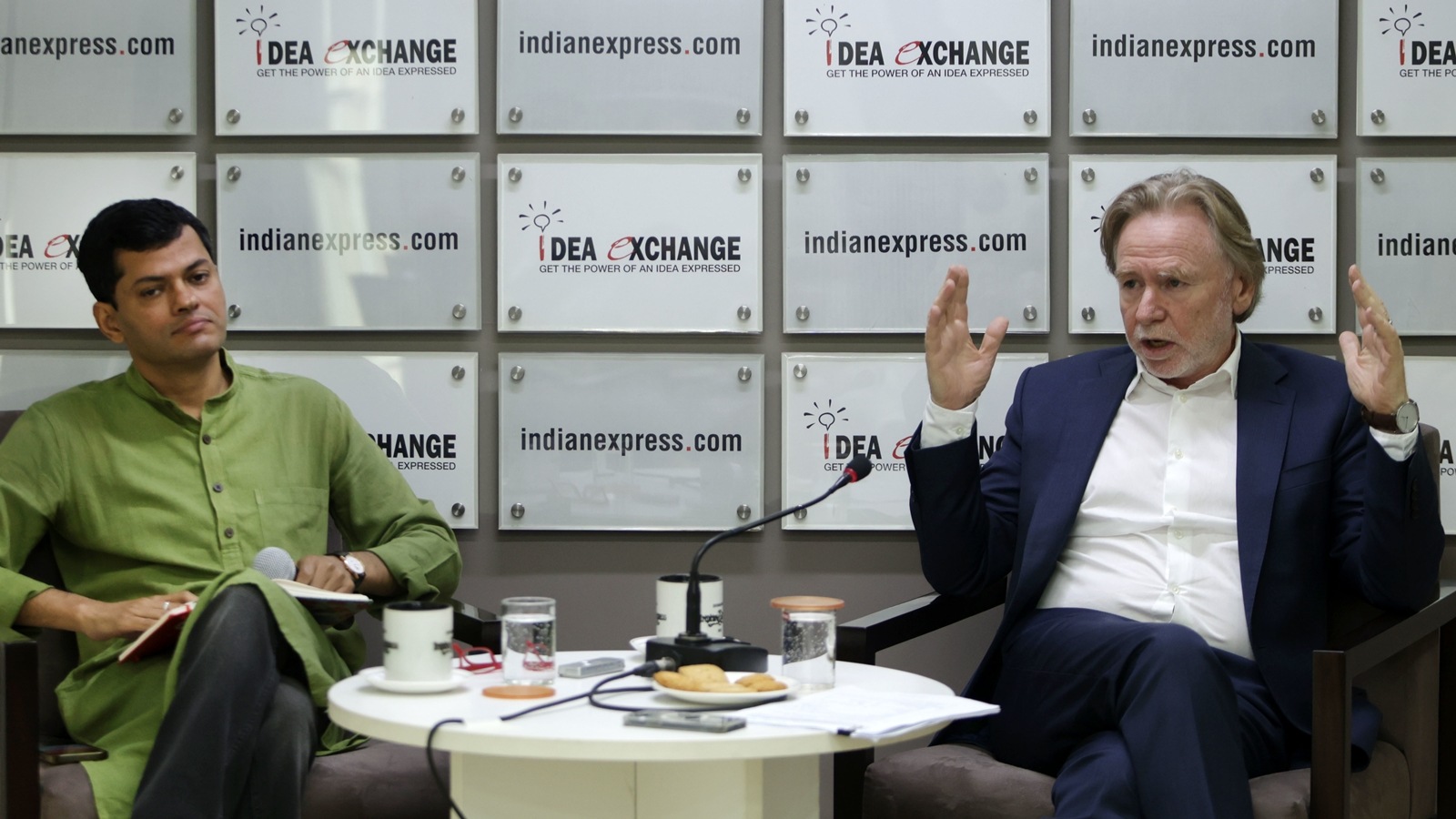 Australian High Commissioner to India Philip Green (right) in conversation with Shubhajit Roy on August 8. (Express photo by Gajendra Yadav)
Australian High Commissioner to India Philip Green (right) in conversation with Shubhajit Roy on August 8. (Express photo by Gajendra Yadav)
Sukalp Sharma: After the war, India’s crude oil purchases from Russia have shot up and we’ve had different kinds of reactions from the global community. Where does Australia stand on this booming trade relationship between Russia and India?
We know that India has a different approach to dealing with Russia than Australia’s. That approach has a lot of historical antecedence, which we don’t share. It has a lot of very current defence significance for India, which we understand. Our approach is different. We think that the sort of activity being undertaken by Russia in Ukraine should be condemned. This is an area of discussion between my government and the Government of India. I don’t propose to have those discussions in a public forum. Our stance, clearly stated, is that we decry and condemn Russia’s illegal invasion of Ukraine.
On Sikh Separatism in Indian Diaspora: It is normal in Australia to exercise the right of peaceful protest, but where those demonstrations turn violent, affect the dignity of a valued nation like India, we draw a line
Story continues below this ad
Aggam Walia: India and Australia are collaborating in strengthening the critical mineral supply chain. What role do you see India playing in these partnerships beyond just being a consumer of critical minerals?
This is a supply chain between Australia and India that has huge significance for the future… I’m working G2G (government to government). There is a partnership between the Australian and Indian governments through Critical Minerals Office and KABIL (Khanij Bidesh India Limited), which is designed to identify critical mineral deposits in Australia that can be pre-qualified for possible investment or off-take by the Indian government and non-government organisations.
Separately, I’m engaged with major Indian industrialists looking for critical minerals off-take directly with Australian institutions. The supply chain is complex. It has five elements. You mine lithium, you transform it into lithium hydroxide, which is processed into cathode active material, that’s then available for cells, and the fifth step is batteries. At the moment, Australia mines lithium and either exports it or transforms it into lithium hydroxide and exports that. On the Indian side, it is either importing batteries or cells. My ambition is that Australia and India together can manage this whole supply chain. The natural way for that to happen is the processing of lithium hydroxide in Australia, which can then be shipped to India for transformation into cathode active material and onto cells and batteries. That’s not something that’s going to take place in a month. That’s a lot of industrial capability to bring together. That’s what the Australian government wants to see occur with India.
Shubhajit Roy: How do you see the investment climate in India and are there states where it is easier for Australians to do business?
When I go around the country and talk to chief ministers, they see me as representing a country with a high level of capability in the field of agriculture. They also tell me that India is an agricultural country. A key ambition is to bring more Australian agricultural technology and capability to the Indian market. Many good companies are already operating in fields like irrigation. We have a lot of cooperation that already happens, including in the field of organics, but I want to grow that. If we can finalise a free trade agreement between Australia and India as a successor to ECTA (Economic Cooperation and Trade Agreement) that we are now enjoying, then I would be very keen that a part of that was an enhanced level of agri-tech cooperation between Australia and India.
Australian firms are investing in India in different ways. Investment is up 30 per cent at the level of fund management over the last five years. In the most recent agreement between India and the EFTA countries, which includes some major overseas investment countries, my country is actually a capital-importing country but obviously we do a degree of capital-exporting.
I would like to highlight the supply chain between Australian raw and semi-produced products for onward manufacture in India. For example, at the moment, an Australian firm makes high-end electric bicycles but it doesn’t make much sense for them to produce in Adelaide, where the firm comes from. Not very much of a domestic market to deal with. They’ve chosen to put their major manufacturing plant using all of that Australian IP in Tamil Nadu. But that’s just one of many.
When you think about Australian cotton and Australian wool, it is going into high-quality Indian rugs and so on. When you think about Australian food products that are part of India’s food processing industry, that’s where the huge investment opportunity is in transforming goods from Australia to finished goods made in India.
Shalini Langer: Indians make up around four per cent of the population in Australia, which is among the biggest destinations of Indian immigrants. The UK recently saw widespread anti-immigrant riots. Immigration is one of the big political issues in the upcoming US elections. Do you think Australia has done something differently to have got it right?
We’re very proud of our multicultural society and that is now baked into Australian politics. Around 50 per cent of Australians were either born overseas or have one or both parents born overseas. That means that it’s much more difficult for anyone who has ill intent to frame there being another — people who are not Australian, not from Australia, not grown up here — for them to be framed as something to be worried about or scared about.
Indian migrants are not only the fastest growing migrant groups in Australia but it’s a migrant group that’s highly respected. According to the Australian census, a person of Indian origin will be twice as likely to have a master’s or further degree than any other migrant group of people. They’ll be 1.5x more likely to open their own business. They’ll be 1.5x more likely to be involved actively in volunteering and social activities in our community. It’s not surprising to me that they’re welcome from every part of Australian society.
Shalini Langer: Do you think there will be a point where this might no longer be true?
We are experiencing some limits in terms of our infrastructural capacity to deal with higher volumes of migration. Let’s not forget that migration was naturally subdued during Covid and there was a spike afterwards, as a result our economy is dealing with some difficulties at the moment; the unavailability of sufficient housing and so on. But that’s confined to the economic sphere and it’s a technocratic issue to deal with. It’s not a sociological problem.
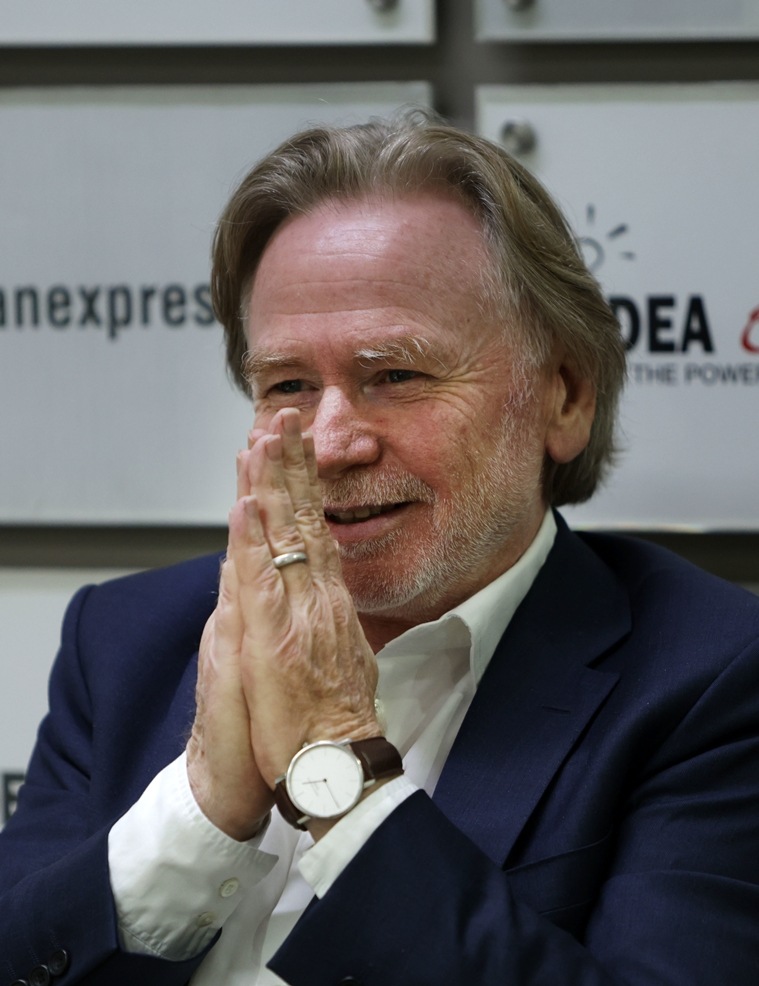 Australian High Commissioner to India Philip Green
Australian High Commissioner to India Philip Green
Shubhajit Roy: The issue of Sikh separatism, Khalistan, has figured in some parts of the Indian diaspora. How does Australia tackle this issue?
This is not a high-level problem for our multicultural society. We’ve been through waves of migration from every continent, and in many of those communities there are divergences within the community. We have systems to deal with it. For us, harmony between social groups is very important. Our multicultural authorities, police, security and intelligence authorities are very alert to problems that could occur within communities. But we need to draw a very clear distinction between what is normal and allowed in our community and the evils that we are trying to snuff out. It is normal, allowed and a right for anyone in Australia to exercise the right of peaceful protest. That is fundamental for us. But where those demonstrations turn violent, and in particular if they were to affect the premises and dignity of a valued nation like India, there we draw a line. Our authorities take huge care to make sure that Indian properties and diplomatic premises are safe and Indian representatives are secure. We know that there have been lapses in other countries. We are very determined that will not happen in our country.
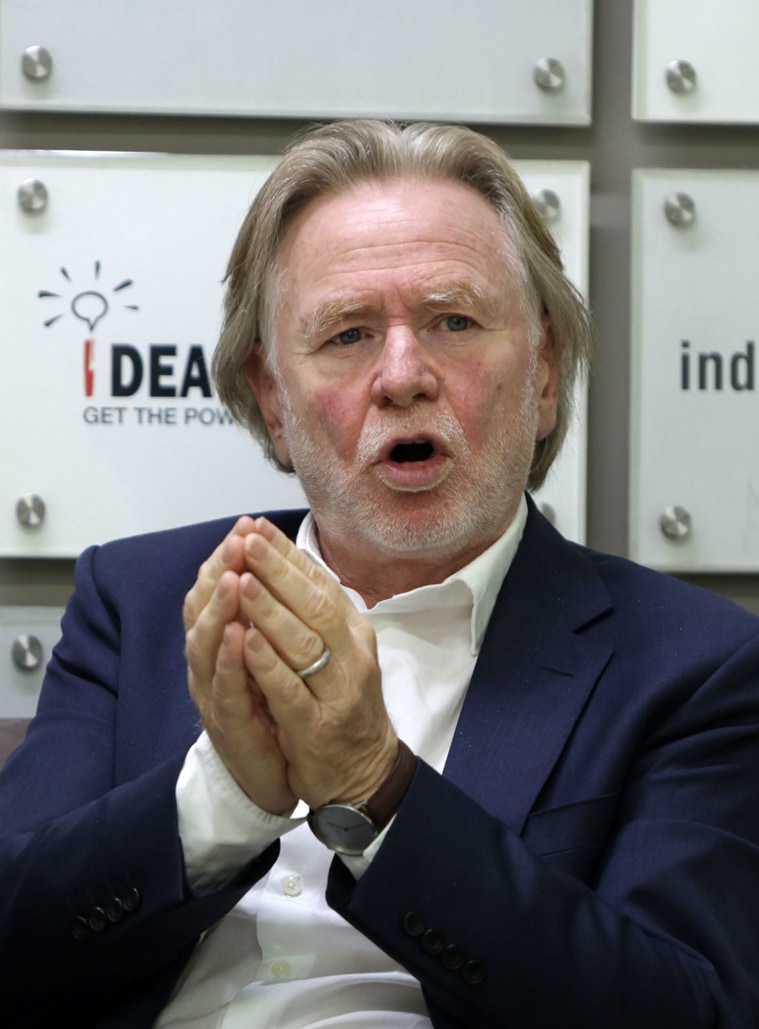 Australian High Commissioner to India Philip Green
Australian High Commissioner to India Philip Green
Sukalp Sharma: Could you give us some sort of a timeline in terms of when we are going to see a full-fledged FTA. Currently, what are the sticking points of negotiations?
Bilateral trade between Australia and India is going extremely strongly. Over the last five years, India’s exports to the world have increased 37 per cent. India’s exports to Australia have increased by more than 60 per cent. Your exports to my country are nearly double the acceleration of your exports to the rest of the world. A lot of that is because of the success of ECTA (Economic Cooperation and Trade Agreement), the first phase of the free trade agreement. Exports of Indian apparel to Australia are up 20 per cent. Exports of iron and steel are up 25 per cent.
There’s a very strong case for further opening of our economies to generate that complementary supply chain… There will be another round of negotiations soon.
I don’t want to talk about sticking points because a lot of the deal will be interlocking, and so it’s difficult to take one part out. It is important for Australia that we have a commercially meaningful deal, including a deal that has more access for Australian agricultural products in this country.
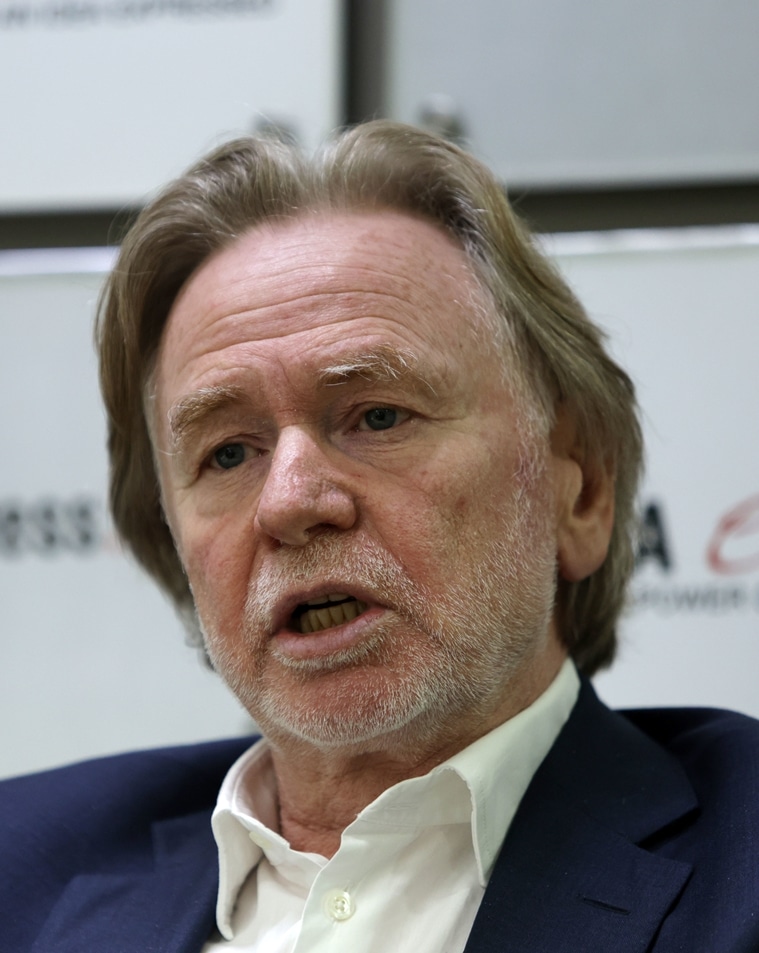 Australian High Commissioner to India Philip Green
Australian High Commissioner to India Philip Green
Shubhajit Roy: What are the targets that you have set for yourself that you want to accomplish by the end of your tenure in India?
I’d like to take a step forward in the way Australia and India are working in the defence and security sphere. That would mean new landing points on maritime domain awareness. I would like to see a second phase of the free trade agreement being settled. We need to find a pathway towards these important and complex supply chains in the green energy sphere. I would like to have a higher level of engagement between Australia and India in agriculture, including agri-tech cooperation.
We want to use cricket to get beyond cricket. The Border-Gavaskar series is happening this summer in Australia — November to January. I’m inviting a very large number of Indian industrialists and political figures to come to Australia for cricket and stay for business. We will find ways of ensuring that they have not just an enjoyable time, but also a professionally rewarding one.
- 01
- 02
- 03
- 04
- 05









